In 2020, 21.8% of U.S. undergraduate college students were Latinos, the second largest ethnic group enrolled at the undergraduate level. Latinos are also more likely to become first-generation college students (44%), compared to Black (34%), Asian (29%) and White (22%) students, according to the Postsecondary National Policy Institute.
But despite the increase in Latino college students, these students seem to receive less aid than the majority of their peers, which is the focal point of award-winning director Cynthia Martinez’s, First Voice Generation. Following three Latinx high school students in Holland, Michigan, the documentary depicts their individual journeys as first-generation Latino students preparing to be the first of their families to attend college, while struggling with their identities in a predominately Dutch community, all while navigating the Covid-19 pandemic.
“[The students] feel like they don’t belong because they’re children of Mexican immigrants,” Martinez said. “They dream of being the first in their family to go to college, but a year of challenges ensues with the global pandemic and the cost of affording college, making it feel like college is impossible to achieve.”
Growing up Latina in Holland, Michigan
Just as the featured students struggled to find themselves in an environment they weren’t reflected in, Martinez did as well. The now-filmmaker, producer and writer grew up in a Mexican-American household as the granddaughter of two migrant farmworkers and the daughter of two hard working parents. From a young age, Martinez noticed the stark difference between herself and her peers, as she spent time on her feet picking blueberries with her family, rather than going on playdates or attending summer camp.
“I was always the only Brown girl in my classroom or on my sports teams,” Martinez said. “I really struggled with that.”
Martinez also began to notice a bigger difference that distinguished her from the people she spent the most time with, other than her family. “Then, there was also that socio-economic difference. A lot of my friends were white and wealthier than I was. That was hard for me. I didn’t see my reflection in my friends or in my teachers.”
Finding her passion
Attending Western Michigan University (WMU) right out of high school, Martinez noticed a significant increase in diversity as she pursued her first dream of becoming a pilot. Never having seen women or Black and Brown people flying planes, together with her dream to travel the world and leave her hometown, inspired her to enter WMU’s aviation program.
Soon after learning how to fly a Cessna 172 single-engine aircraft, Martinez had to leave the program due to its numerous additional expenses, which she could not afford. Switching to the aviation administration science major, she learned about airports, airlines and how to work in a corporate setting in aviation. Today, her experience with changing her aspirations due to an inability to afford them drives her to advocate for accessible education.
“It gets me fired up when I see other students like myself wanting to pursue a career that is very much needed or we need representation for,” Martinez said. “The next generation needs to see themselves reflected in careers like STEM, business or being doctors, and other Latinos need to see that. They need to know that they can do it and that’s partly why I made the film. I want to help make higher education and college accessible to Latinos.”
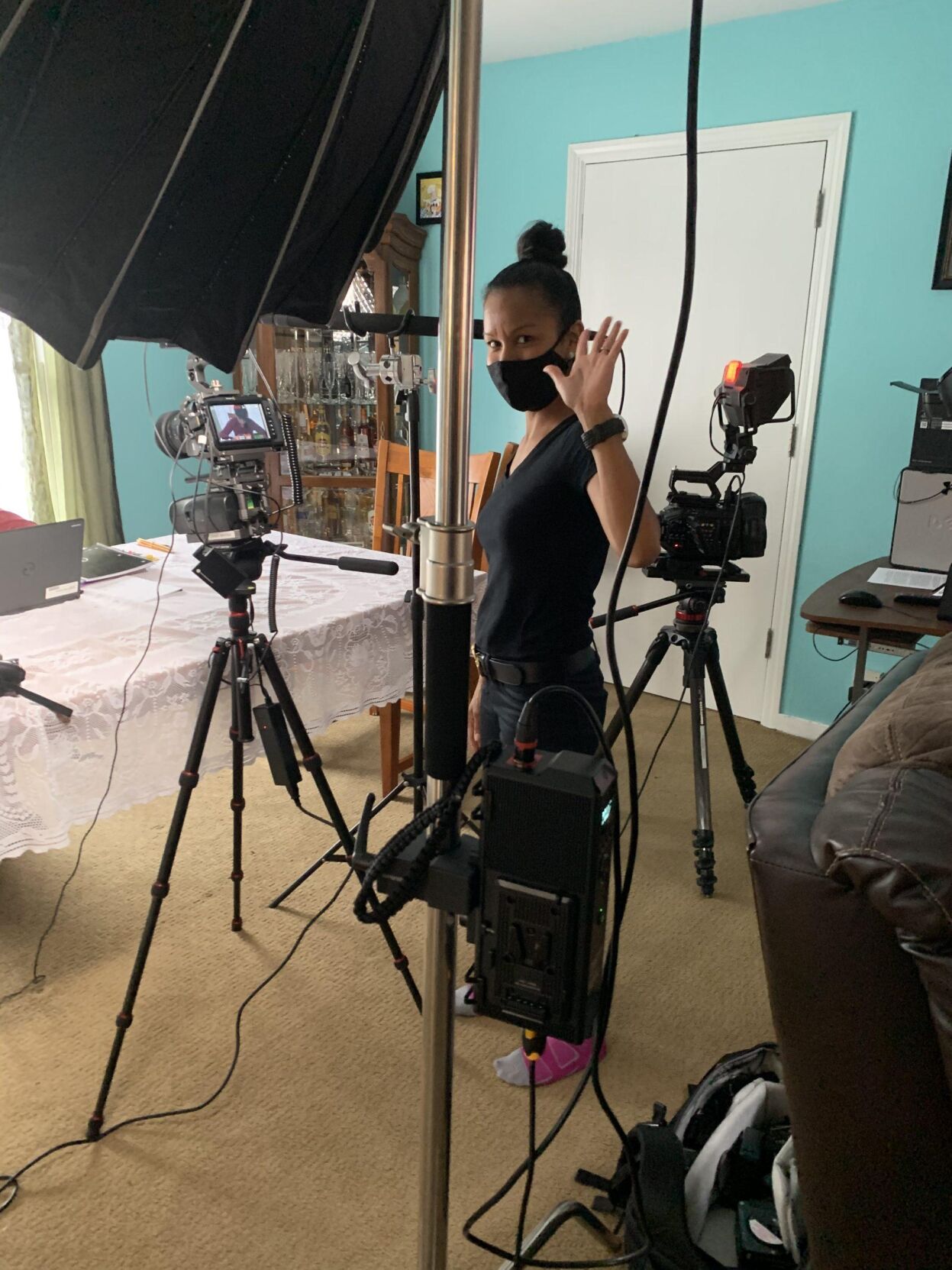
First Voice Generation
Right out of college, the filmmaker worked as a live-in nanny outside of Chicago to begin paying off her loan debt. Two years later, Martinez read a Forbes article describing nanny jobs in Los Angeles and New York for high-profile families that entailed a six-figure salary, which led her to the Big Apple. Many NDAs and an incredible living experience in Manhattan later, in her late 20s she decided to apply to Columbia University’s graduate school of Journalism, where she received her master’s in broadcast journalism in 2012.
“You come out of that program knowing how to write, edit and produce. You have to learn every facet of journalism,” Martinez said. “That’s served me to this day because I’ve been able to make a film. I went on to work at Univisión and would do three-minute news pieces. I learned how to get the story and they teach you that at Columbia and that’s what set the foundation that helped me make the film.”
Becoming a director
Prior to the Covid-19 pandemic, Martinez lived in Miami and Phoenix and moved back to Chicago for her husband’s job in 2020. But when the world shut down and he went remote, the two, along with their son, moved back to Holland, which wasn’t exactly welcomed by the filmmaker, but she decided to make the most of it.
“I was like, ‘Here I am, back in the place I never wanted to be and I don’t know what to do with myself,’” Martinez said. “I had to reinvent myself, and I thought, ‘There’s a reason I’m here. I’m not really sure yet what that is, but how do I use my education? How do I give back to the students like me? What can I do to help other kids not feel like they don’t belong here? How do I help the next generation?’”
In the midst of her questioning, she stumbled upon a Facebook post regarding the TRIO Upward Bound Program’s (UB) – a government-funded program committed to helping first-generation college students successfully graduate high school and enter college – struggle to function during the pandemic. Normally, an in-person program that became virtual was a huge help to Martinez in her youth, which made their hardships hit her harder than most.
After reaching out to UB and learning how the students were being affected, Martinez asked if documenting their experiences would be possible. Out of 70 students, she began following seven of them, all of them, coincidentally, Latino. She had no idea this small project would become her first-ever film.
“In the end, the film focuses on three of them. I only thought I was going to be filming them for a few months, and I ended up following their lives and their family’s lives. It became so much more than what I had started out thinking.”
Filming the documentary during the 2020 pandemic proved to be quite the feat and so did self-funding the production. Martinez realized she could no longer lean solely on the support of her and her husband so, with the help of a friend, reached out to Craig Spoelhof, the executive director of the Boys and Girls Club of Greater Holland, to financially sponsor the film. After gaining a fiduciary for the project, the filmmaker started a Kickstarter, where, in 30 days, $51,621 was pledged out of the $50,000 goal.
It was Martinez’s discomfort being back in her hometown, her frustration with the lack of access to a college education for first-generation students and her fear of UB students struggling the same way she did that inspired First Voice Generation, but it was having a community behind her that allowed the show to go on.
“[It’s about] bringing awareness to the many students, first-generation students, students of color, low-income students who face challenges and what those barriers look like through the Latino lens,” Martinez said. “I didn’t intentionally, when I started the project, mean for it to be Latino students; it just ended up being that way. It was about the first-generation challenges, and then their families ended up being from Mexico.”
Highlighting first-generation Latino students
Narrowing the students down was simply due to which stories were the strongest, which turned out to be Nayeli Mora, who attended West Ottawa High School, and Angel Ruiz and Gael Figueroa-Enriquez, who both attended Holland High. Martinez first met Mora when she was mentoring and résume advising UB students. She was immensely impressed by Mora’s aspirations and confidence at such a young age.
Although she grew up in Holland, Mora was born in Mexico and moved to the United States with her parents when she was a young girl. Since she can remember, the Grand Valley State University student has been passionate about immigration law, which stems from going with her mother to meet with immigration lawyers as a child and translating the conversation. She’s currently a political science major with a Spanish minor, but, like Martinez, had a difficult experience growing up in a predominantly White environment.
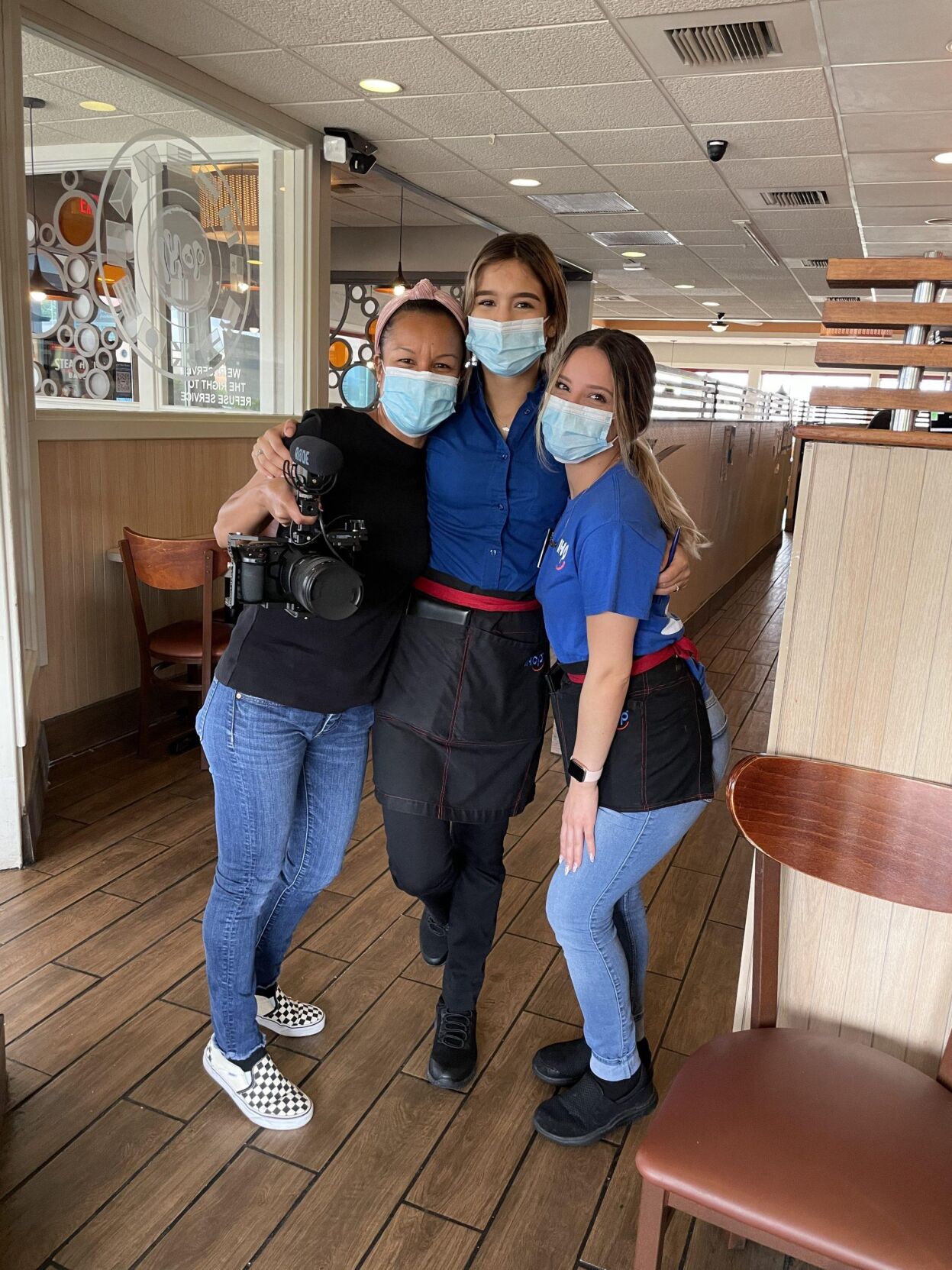
First Voice Generation
“I felt like the odd one out,” Mora said. “Not being able to learn about my culture, and not having people that looked like me and spoke like me. It was definitely hard to create friendships and really good relationships with teachers. It was always an uncomfortable feeling. I always felt out of place there. I never felt like I was truly a part of any friend groups or part of anything at all, really.”
Ruiz’s family immigrated to Michigan from Agua Calientes, Mexico, when her mother was 14. A biochemistry student at Kalamazoo College, the sophomore is in a POC (people of color)-only accapella group, where students can uplift each other and feel comfortable in a space that reflects them.
Like Martinez and Mora, growing up was difficult in the predominantly-Dutch community, where she and her grandmother would receive dirty looks for speaking Spanish in the grocery store.
“Thinking about it makes me feel sad because people shouldn’t go through that experience because of how uncomfortable it is,” Ruiz said. “It’s out of our control. We shouldn’t blame ourselves for our differences. Friend-wise, a lot of my friends were White and that definitely had a toll on how I viewed myself because I didn’t look like them. I can’t change what I look like, I can’t change my skin color, my family, my culture. That was a hard thing to go through and I still experience it to this day.”
The struggles of imposter syndrome
Despite feeling excitement about being the first in their families to attend college, for Mora and Ruiz, the heavy weight of imposter syndrome sits on their shoulders. From the guilt that comes with having opportunities your family didn’t have to feeling like you’re behind due to lack of resources, it’s difficult to see the light at the end of the tunnel at times, which is something they remind themselves of.
“I definitely knew I wanted to go [to college], I just didn’t know how to get there,” Mora said. “It was really stressful because I felt like I was behind. I still feel like I’m behind, like impostor syndrome. It’s going away slowly because I put in the work and I see that it’s going to be worth it in the end, but it definitely brings difficulties of feeling like I don’t belong there.”
These three students, at the time of filming, were all in Martinez’s shoes, not only being first-generation but growing up in the same city she did and attending the same school. It was an overwhelming experience overall, but filming at her old high school was a ball of emotions.
“It was hard. There are those things that I was running away from when I didn’t want to live in my community. All of those things we [sometimes] deal with as a Latino community, some of those challenges deal with abuse or dealing with drinking. It evokes those feelings of, ‘Oh, there’s that street where this incident happened with my family,’ driving down the road past my church as a kid, it made me emotional. I hated my high school, so filming there was very emotional. Cathartic.”
Starting a conversation
Martinez knew that, regardless of how uncomfortable revisiting her past definitely was, there was a bigger picture and she couldn’t turn back even if she wanted to. Creating a film that first-generation students and Latinos could watch and see themselves represented in was too important, as was sparking conversations among viewers and, potentially, lawmakers.
“It’s to educate lawmakers, it’s to educate people who work in higher education to know that there are these challenges and that higher education should be accessible to everyone,” Martinez said. “The opportunity should be equitable. I do hope those conversations happen. My biggest dream, and I will keep saying it until it happens, is that I would love to have this screened at the White House.”
“Que sí se puede”
First Voice Generation first premiered at the Central Michigan International Film Festival on February 18 of this year and has since been featured at the Capital City Film Festival in Lansing on April 15, the Mexican-American Film and Television Festival in LA on May 20 and the Caplan Center for Performing Arts in Philadelphia on June 10.
On August 5, the documentary will also be screened at the Tobin Center, a non-profit performing arts center in San Antonio, and, through each showing, it’s been most important for Latinx students to see their experiences on-screen and know that they’re capable of whatever they dream of.
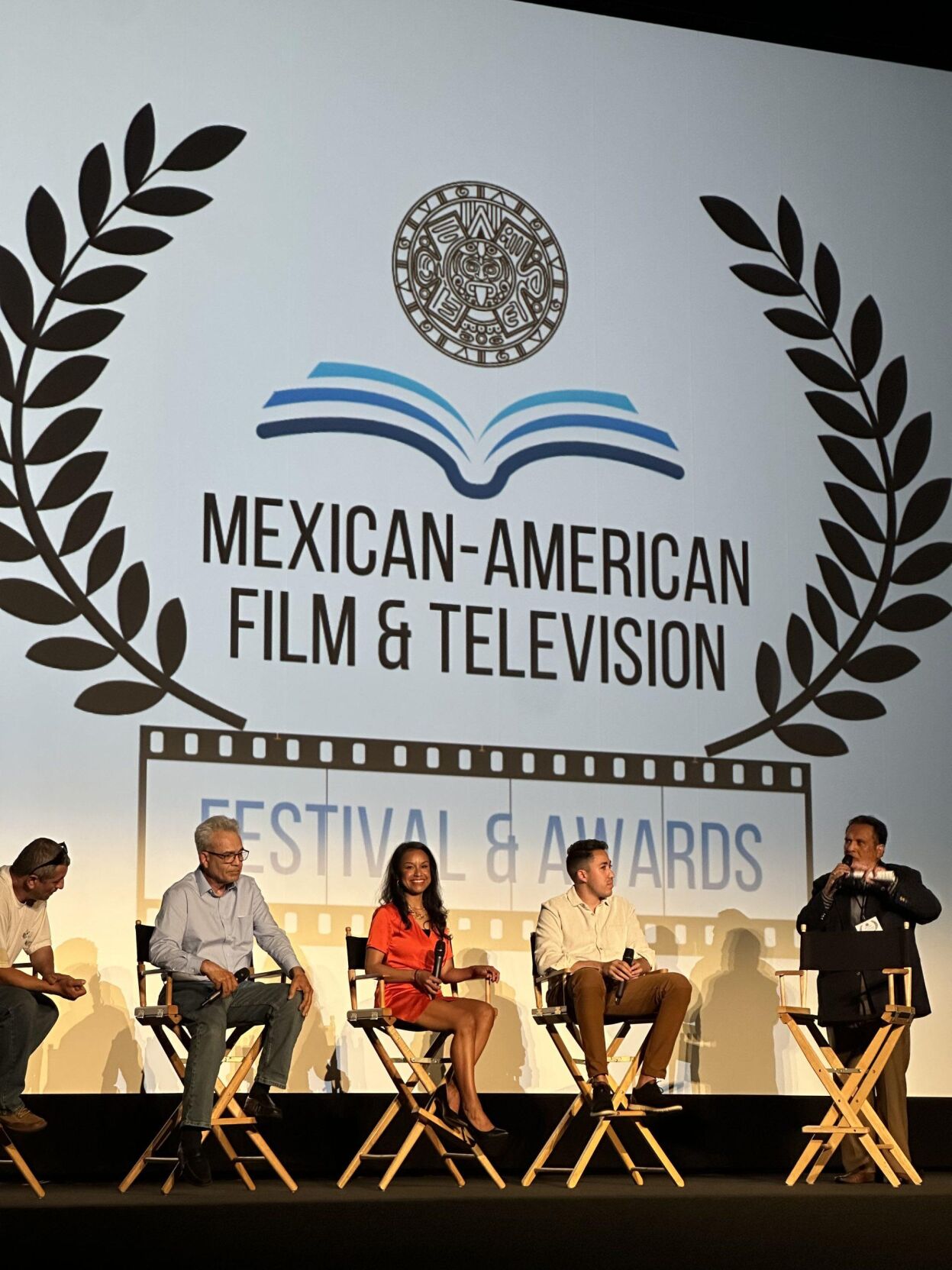
First Voice Generation
“If they have this dream or goal to be the first in their family, they can do it,” Martinez said. “It is that much harder for us, but they can do it. I’ve seen the kids in my film do it, I’ve done it, it is possible. It’s not going to be easy. Progress is not linear. It doesn’t happen. There will be bumps in the road, a lot of them, but you can overcome them.”
It’s exactly this advice that pushed the filmmaker to be a first-generation college student and all the way, through aviation and journalism to becoming a filmmaker who took home the award for “Best Director” at the Mexican-American Film and Television Festival. Latina representation is severely lacking in the entertainment industry, specifically in directorial work, but through First Voice Generation, Martinez is enacting change one step at a time.
“You don’t see a lot of women in this industry, and you definitely don’t see a lot of women of color in the industry,” Martinez said. “I find myself in spaces where not a lot of people look like me. I guess that’s sort of the call on my life that, since I was little, that’s been the space that I’ve had to navigate. Here I am having to navigate it again and that’s okay. If I have to do that, to pave the road for the next person, I’m happy to do that. That’s what this film is all about.”
If you are interested in learning more about Martinez or her documentary film, First Voice Generation, follow its Instagram or check out the official website.
Read more stories here.

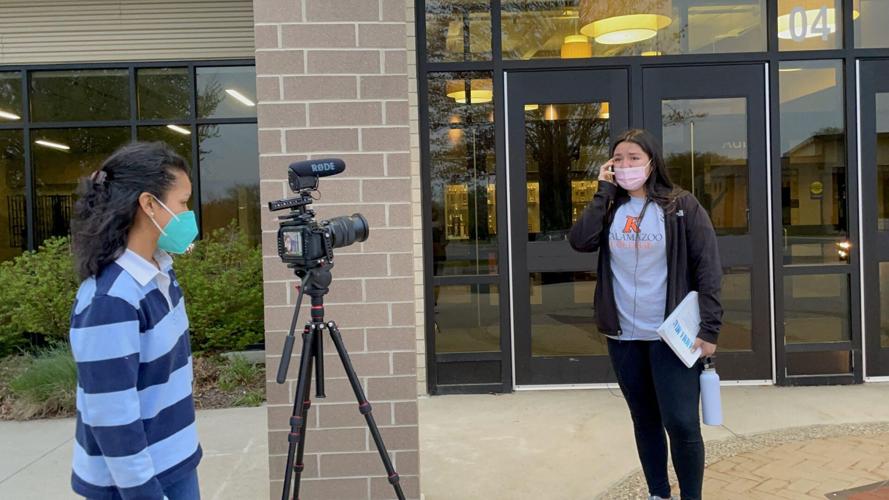
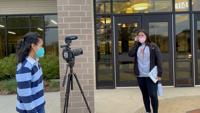
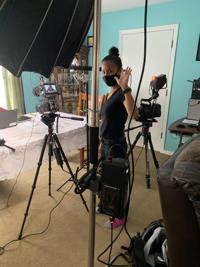
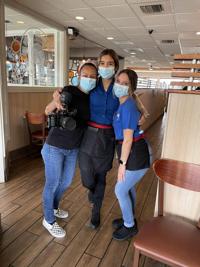

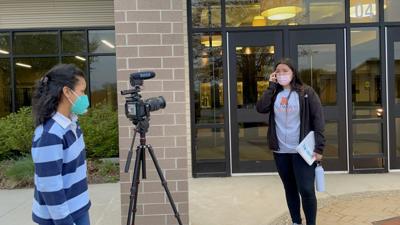

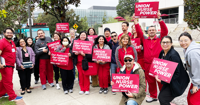

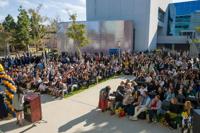




(0) comments
Welcome to the discussion.
Log In
Keep it Clean. Please avoid obscene, vulgar, lewd, racist or sexually-oriented language.
PLEASE TURN OFF YOUR CAPS LOCK.
Don't Threaten. Threats of harming another person will not be tolerated.
Be Truthful. Don't knowingly lie about anyone or anything.
Be Nice. No racism, sexism or any sort of -ism that is degrading to another person.
Be Proactive. Use the 'Report' link on each comment to let us know of abusive posts.
Share with Us. We'd love to hear eyewitness accounts, the history behind an article.